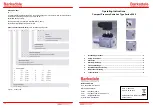
SECTION 1
INSTALLATION
1---1
Series 300 Automatic Transfer Switches are factory wired
and tested. Installation requires skid removal then
securing the enclosure to the supporting foundation.
Remove the Shipping Skid
Open the front door and remove the four lag screws (2 in
front, 2 in rear) securing enclosure to the wood skid.
Supporting Foundation
The supporting foundation for the enclosure must be
level and straight. Refer to the applicable enclosure
outline drawing included with the Series 300 for all
mounting details including door opening space.
If bottom cable entry is used, the foundation must be
prepared so that the conduit stubs are located correctly.
Refer to the enclosure outline drawing for specified area
and location. Provide cable bending space and clearance
to live metal parts. When a concrete floor is poured, use
interlocking conduit spacer caps or a wood or metal
template to maintain proper conduit alignment.
Mounting
Refer to the applicable enclosure outline drawing fur-
nished with this switch and mount the Series 300
according to details and instructions shown on diagram.
Line Connections
Refer to the Wiring Diagram provided with your Series
300 ATS. All wiring must be made in accordance with the
National Electrical Code and local codes.
It is unnecessary to remove pole covers from the transfer
switch. If you do remove them, reinstall them carefully.
De–energize the conductors before making any
line or auxiliary circuitry connections. Be sure
that Normal and Emergency line connections
are in proper phase rotation. Place engine gen-
erator starting control in the OFF position. Make
sure engine generator is not in operation.
Testing Power Conductors
Do not connect the power conductors to the ASCO
Series 300 transfer switch until they are tested. Installing
power cables in conduit, cable troughs and ceiling-sus-
pended hangers often requires considerable force. The
pulling of cables can damage insulation and stretch or
break the conductor’s strands. For this reason, after the
cables are pulled into position, and before they are
connected, they should be tested to verify that they are
not defective or have been damaged during installation.
Protect the automatic transfer switch from
construction grit and metal chips to prevent
malfunction or shortened life of the ATS.
Connecting Power Conductors
After the power cables have been tested, connect them to
the appropriate terminal lugs on the transfer switch as
shown on the wiring diagram provided with this Series
300. Make sure the lugs provided are suitable for use with
the cables being installed. Standard terminal lugs are
solderless screw type and will accept the wire sizes listed
on the drawings provided with the Series 300. Be careful
when stripping insulation from the cables; avoid nicking
or ringing the conductor. Remove surface oxides from
cables by cleaning with a wire brush. When aluminum
cable is used, apply joint compound to conductors.
Tighten cable lugs to the torque specified on rating label.
Controller Ground
A grounding wire must be connected to the controller’s
lower left mounting stud. Because the controller is
mounted on the enclosure door, a conductive strap must
be used between the enclosure and the door. This
connection provides proper grounding which does not
rely upon the door hinges.
Harnesses
The transfer switch is connected to the left side of the
controller by a plug–in harness (two plugs).






































